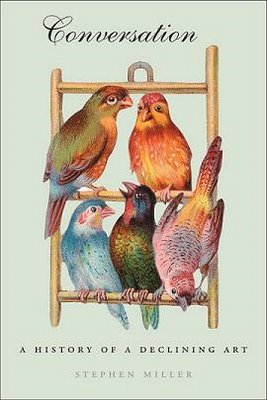THE DECLINE OF CONVERSATION
Stephen Miller is a freelance writer and a contributing editor to The Wilson Quarterly. His essays have appeared in many magazines, including the Times Literary Supplement, Partisan Review, and Sewanee Review. The author traces a prolonged decline in the theory and practice of conversation. He cites our technology (iPods, cell phones, and video games) and our insistence on unguarded forthrightness as well as our fear of being judgmental as powerful forces that are likely to diminish the art of conversation. By Michael Cook ______________________ MercatorNet: The crux of your book is that conversation is a declining art. How can that be so? People seem to be talking as much as ever. Stephen Miller: In my book I distinguish face-to-face conversation, which I consider the ideal form of conversation, from virtual conversation (either by phone, email, instant messaging, or text-messaging). It seems to me that face-to-face conversation is decreasing. I have no conversation meter to compare face-to-face conversation now with face-to-face conversation three decades ago, but in the past two years several studies have argued that people, especially young people, are spending an increasing amount of time in the virtual world. It would be wrong to say that conversation cannot take place in the virtual world, but it is an inferior form of conversation, since it lacks the gestures and nuances of face-to-face conversation. (Phone conversation is better than email conversation.)  [Is your best friend really your iPod? Stephen Miller the author of Conversation: A History of a Declining Art (Yale University Press, 2006) doesn't think so.
[Is your best friend really your iPod? Stephen Miller the author of Conversation: A History of a Declining Art (Yale University Press, 2006) doesn't think so.
 "Miller is at his best in analysing the decline announced in the subtitle of his book. In the end, Miller ascribes the success of a good conversation to politeness, and its decline to a loss of good manners. 'Conversation avoidance devices', he writes, 'are enemies of politeness insofar as they make it difficult for people to be attentive listeners.' And of course, Miller reflects on the world of virtual conversation in which, by and large, the semblance of exchange replaces true exchange. He confesses to checking his email six times a day, reading the New York Times online morning and afternoon, and frequently Googling people he has only met or read about – 'simply out of idle curiosity'. He quotes a 2005 study according to which (in the USA at least) children pack 'roughly eight and a half hours of media exposure into six and a half hours each day, seven days a week. (They often have several media going at the same time)'. A children’s party in which nine-year-olds were asked to bring a computer so that they could play video games is mentioned. In such a world, the engagement with the other is merely formal: the screen allows us to avoid commitment. At the same time, Miller admits the obvious benefits that certain kinds of conversation can draw from the electronic technology, especially in countries where talk is censored: email exchanges in China (in spite of Microsoft’s betrayal of its internauts), SMS messaging during the Ukraine Orange Revolution."
"Miller is at his best in analysing the decline announced in the subtitle of his book. In the end, Miller ascribes the success of a good conversation to politeness, and its decline to a loss of good manners. 'Conversation avoidance devices', he writes, 'are enemies of politeness insofar as they make it difficult for people to be attentive listeners.' And of course, Miller reflects on the world of virtual conversation in which, by and large, the semblance of exchange replaces true exchange. He confesses to checking his email six times a day, reading the New York Times online morning and afternoon, and frequently Googling people he has only met or read about – 'simply out of idle curiosity'. He quotes a 2005 study according to which (in the USA at least) children pack 'roughly eight and a half hours of media exposure into six and a half hours each day, seven days a week. (They often have several media going at the same time)'. A children’s party in which nine-year-olds were asked to bring a computer so that they could play video games is mentioned. In such a world, the engagement with the other is merely formal: the screen allows us to avoid commitment. At the same time, Miller admits the obvious benefits that certain kinds of conversation can draw from the electronic technology, especially in countries where talk is censored: email exchanges in China (in spite of Microsoft’s betrayal of its internauts), SMS messaging during the Ukraine Orange Revolution."
"Technology set in opposition to social intercourse is not a new idea. Van Wyck Brooks suggested that Jefferson’s improvement of the argand lamp had dampened the brilliance of conversation in early nineteenth-century Boston, because 'those who had excelled in talking took to their books and writing-desks'. Orwell (as Stephen Miller reminds us) thought that the radio undermined conversation, preventing it from becoming serious or even coherent. Today, the person sitting in a café with a mobile in his right hand, a laptop at his left, a television screen flashing in front of him and music blaring from a loudspeaker behind him, is not likely to engage in any rich conversation. In the developed world at least, we have forgotten how to listen to our thoughts and to those of others, and how to weave our ideas into a common strand. One of the original meanings of the Latin conversari was 'to live together'. That too, we have forgotten."
#334 Varios Categoria-Varios: Etica y Antropologia









0 Comments:
Publicar un comentario
<< Home